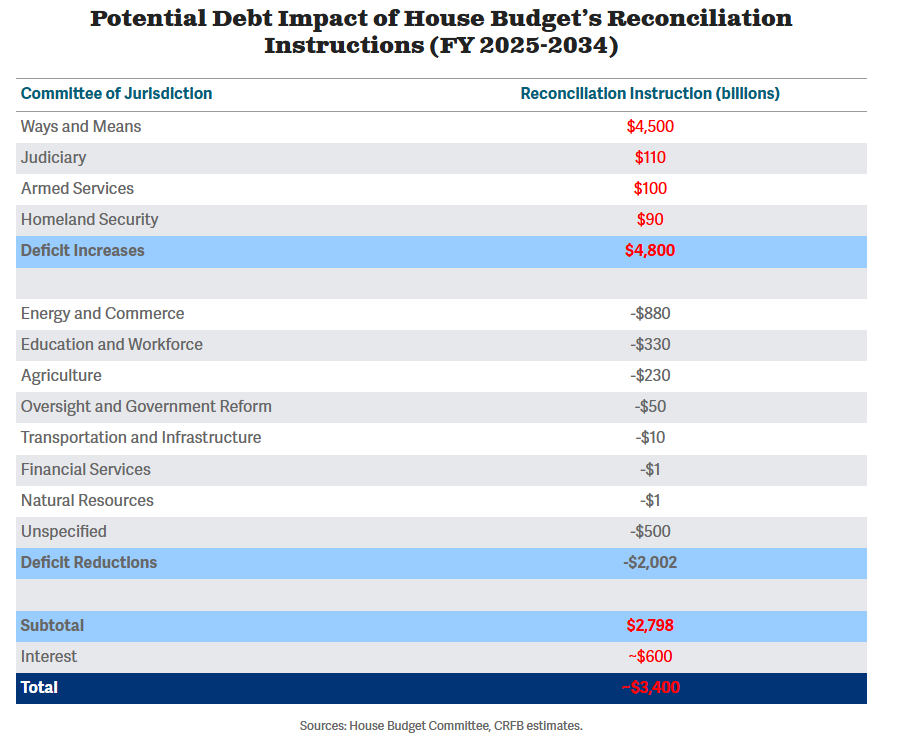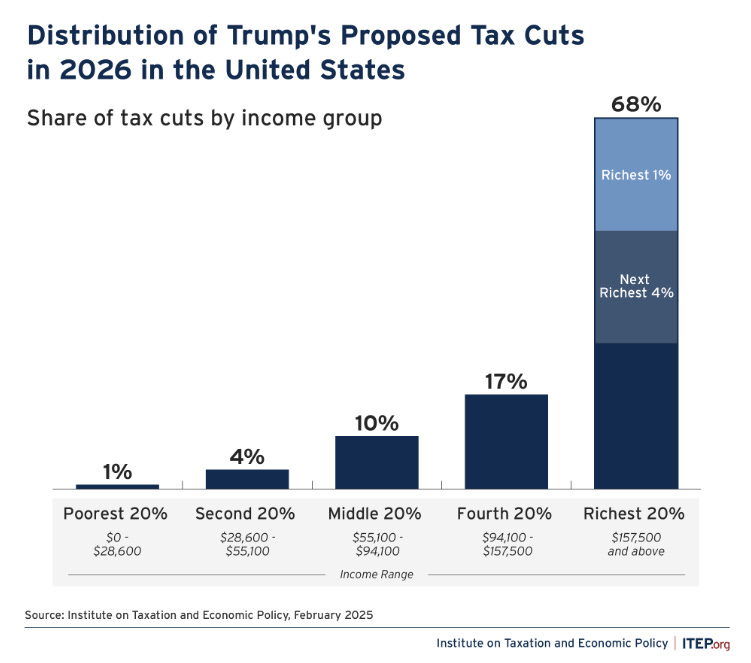A (modern) Modest Proposal
For a world where fiscal stewardship no longer exists in any real form
Every budget is a values statement. We spend money in the places that reflect our values, and we cut money in places, and people, we see as less valuable, less important.
This week, The United States Congress - comprised of Representatives and Senators elected to stand for your interests - have shown us their values by their vote on the “big, beautiful” budget bill that President Trump proposed.
It passed the House, 217-215. In Kansas, Republican Representatives Ron Estes, Tracey Mann, and Derek Schmidt all voted for it. Rep. Sharice Davids voted against it. This sets the framework for budget discussions going forward - so this isn’t final and the specifics are set in stone. But it will likely be very close to this budget resolution.
Here’s one bit of simple reporting I could find.
Here are the areas where spending would increase:
Up to $110 billion in additional spending for the Judiciary Committee
Up to $100 billion for the Armed Services Committee
Up to $90 billion for the Homeland Security Committee
Here are the committees that are tasked with finding the cuts:
At least $880 billion by the Energy and Commerce Committee
At least $330 billion by the Education and Workforce Committee
At least $230 billion by the Agriculture Committee
At least $50 billion by the Oversight and Government Reform Committee
At least $10 billion by the Transportation and Infrastructure Committee
At least $1 billion by the Financial Services Committee
At least $1 billion by the Natural Resources Committee
The final product must be deficit-neutral to comply with reconciliation rules, and Republicans are relying on economic projections that show the tax cuts would spur economic growth that would increase tax revenues. Those projections have been questioned by outside experts and Democrats who describe them as overly optimistic. One analysis found that the budget proposal would allow for a deficit increase of $2.8 trillion through 2034.
And here’s a decent graphic.
This resolution does a number of things including a few things the majority party has said it doesn’t like - such as raising the debt ceiling and potentially increasing the long-term deficit. I guess supporters will argue that future increased tax revenues from all that trickle down we’re going to experience will spur massive economic activity, and additional tax revenue. Those of us in Kansas know how that works out. And, honestly, I don’t know how anyone is still buying the lie that giving tax breaks to the wealthy helps anyone but the wealthy. Since the days of this farce of economic policy has been in place, we have watched a generation of people languish while the a few people amass unfathomable wealth.
That takes me to the core contradiction in this resolution - $4.5 trillion in tax cuts, financed through an array of cuts. The tax cuts could be made bigger, if Congress finds additional cuts.
The cost to provide $1.1 trillion in tax cuts for the top 1 percent of U.S. households (average $787,712 income per year) is roughly the same amount of cuts proposed for Medicaid health coverage and food benefits from SNAP (Supplemental Nutrition Assistance Program).
The U.S. median household income in 2023 was $80,610. In Kansas the median household income was $72,639, in Reno County it was $60,498. In the 67501 Zip code that was $50,069. If I burrow down to the Census tract around the Lincoln neighborhoods, the median household income is $49,620, while the area around Avenue A is $30,765.
These are the people Kansas House Speaker Dan Hawkins will tell you are able bodied adults who could work but won’t. They are working. They just work in fields that don’t pay terribly much. That’s not a sin, and it doesn’t mean they are an ounce less valuable than the wealthiest person in Kansas, or the world. I’d take a whole lot of them over the insufferable and entitled sycophants we’ve had to endure in this year’s Kansas Legislature.
Here’s a graphic of how the proposed tax cuts will be distributed. You’ll notice that a measly 4 percent of those cuts will go the income levels of most Hutchinson residents.
To me, this isn’t even a matter rooted in politics. It’s rooted in human decency, and the idea that government should be doing the most good for the most people. Our system, which now seems to be run by the wealthiest man on the planet, has been perverted. Yet a lot of people in this country seem to not only accept these policies - they are eager to see the cuts happen and the tax cuts deployed - even though they’ll see none of the savings and, potentially, all of the harm.
I can accept to a certain degree the idea that government is large, lumbering, at times inefficient, and often slow. There can always be a case made for increased efficiency and cost savings. What I can’t accept is that we must harm people in order to enrich people who already have enormous wealth. But it looks like that’s exactly what we’re going to do.
The entire conversation reminded me of the famous essay by Johnathon Swift, A Modest Proposal, written in 1792 and an enduring example of ironic and satirical writing.
If the poor protest their plight, simply let them eat their young. It is the same in 2025 as it was in 1792. And I suspect it will be same 100, 1,000, and 10,000 years from now.
“It is a melancholy object to those, who walk through this great town, or travel in the country, when they see the streets, the roads, and cabbin-doors crowded with beggars of the female sex, followed by three, four, or six children, all in rags, and importuning every passenger for an alms. These mothers, instead of being able to work for their honest livelihood, are forced to employ all their time in stroling to beg sustenance for their helpless infants who, as they grow up, either turn thieves for want of work, or leave their dear native country, to fight for the Pretender in Spain, or sell themselves to the Barbadoes.
I think it is agreed by all parties, that this prodigious number of children in the arms, or on the backs, or at the heels of their mothers, and frequently of their fathers, is in the present deplorable state of the kingdom, a very great additional grievance; and therefore whoever could find out a fair, cheap and easy method of making these children sound and useful members of the commonwealth, would deserve so well of the publick, as to have his statue set up for a preserver of the nation.
But my intention is very far from being confined to provide only for the children of professed beggars: it is of a much greater extent, and shall take in the whole number of infants at a certain age, who are born of parents in effect as little able to support them, as those who demand our charity in the streets….
“I shall now therefore humbly propose my own thoughts, which I hope will not be liable to the least objection.
I have been assured by a very knowing American of my acquaintance in London, that a young healthy child well nursed, is, at a year old, a most delicious nourishing and wholesome food, whether stewed, roasted, baked, or boiled; and I make no doubt that it will equally serve in a fricasee, or a ragoust.
I do therefore humbly offer it to publick consideration, that of the hundred and twenty thousand children, already computed, twenty thousand may be reserved for breed, whereof only one fourth part to be males; which is more than we allow to sheep, black cattle, or swine, and my reason is, that these children are seldom the fruits of marriage, a circumstance not much regarded by our savages, therefore, one male will be sufficient to serve four females. That the remaining hundred thousand may, at a year old, be offered in sale to the persons of quality and fortune, through the kingdom, always advising the mother to let them suck plentifully in the last month, so as to render them plump, and fat for a good table. A child will make two dishes at an entertainment for friends, and when the family dines alone, the fore or hind quarter will make a reasonable dish, and seasoned with a little pepper or salt, will be very good boiled on the fourth day, especially in winter.




